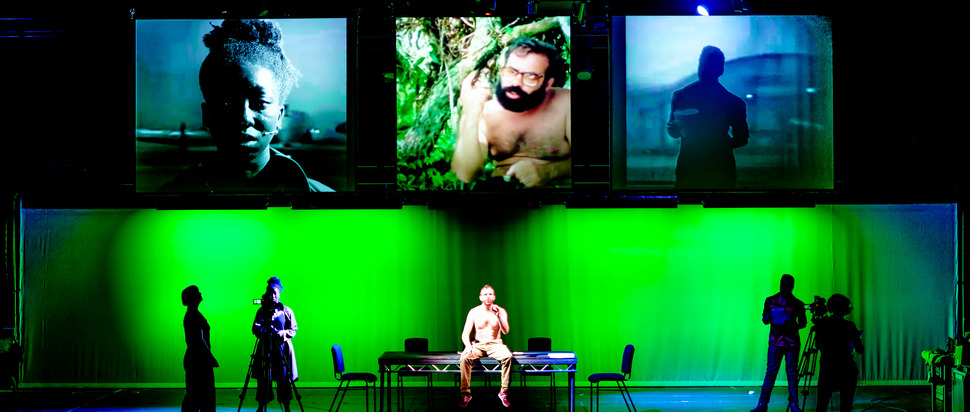Heart of Darkness @ Tron Theatre, Glasgow
imitating the dog's new take on Heart of Darkness is an ambitious but destabilising reappraisal of Joseph Conrad's novella
Following their 2014 adaption of Ernest Hemingway’s A Farewell to Arms, theatre company imitating the dog return with an adaption of Joseph Conrad’s 1899 novella, Heart of Darkness – another seminal, problematic classic (which then inspired another seminal, at times problematic classic, Apocalypse Now). Heart of Darkness is a formative text from a body of literature by white European writers about the violent, racist exploitation of Britain’s colonial territories as the influence of capitalism was dawning. The book has been both championed and slated for its representation of the European colonisation of Africa – it shines a light on imperialism, but only from the perspective of a white, European male. Progressive for 1899; in 2019 Brexitarian-apocalyptic glory, it doesn’t float.
imitating the dog are attempting to address and rectify these issues, and the result is a piece that straddles massive topics of colonialism and adaptation, explored through performance, multi-media and dramaturgy. Heart of Darkness starts from its own conception, in a 2019 boardroom with various British creatives from differing racial backgrounds deciphering how to make a film out of this problematic text, without giving precedence to its problems. The answer, as always in this case, is to make explicit your awareness of the problems within by making the problems themselves explicit.
Writer-directors Andrew Quick and Pete Brooks imperfectly manage this reversal, which is performed excellently by the cast. Overseen by a narrator-type (Laura Atherton), Marlow (Keicha Greenidge) is a Black female; the heart of darkness is post-apocalyptic London; and Kurtz (Matt Prendergast) is the walking, talking mouthpiece for other, more silent evils: Johnson and Farage, who are also white males, as well as capitalism, colonialism and, of course, Brexit. We watch a Black female voice challenging power, critiquing a culture that is so due that critique. This is important.
Heart of Darkness is a reaching piece, and sometimes it reaches too far: whilst the talent of each member of the cast and crew is illustrated through the stagecraft, at times it's at risk of being diminished by the sheer amount of what is going on. There are beautiful moments, particularly the physicality of Greenidge and Artherton, but much of the rawness of the piece is troubled by unnecessary exposition. The audience are pulled between their suspension of disbelief and a complete sensory overload, as the blend of Quick and Brooks' theatre grapples with Simon Wainwright’s video design, and the confrontation is physically splayed out by the ensemble. Like Brexit, it's destabilizing to watch. If this is the intent, it's met effortlessly. If not, there is still a way to go.
Heart of Darkness @ Tron Theatre, Glasgow, run ended
